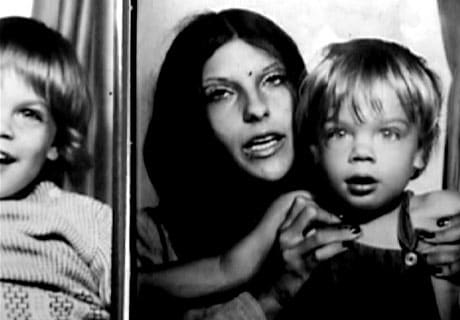Maybe this is as close as we'll get to seeing the workings of someone's mind shaped into a movie. Jonathan Caouette has a story to tell (his own and his mother's) and he burned it onto the screen by using iMovie to put together the filmed pieces of his life (video, Super 8, family photos, etc.).
This is by no means a conventional work of autobiography some of the best sequences venture into surrealism and there are some parts that seem staged or re-enacted. All of this is quite fitting Caouette has battled something called "depersonalisation syndrome" ever since he had a bad experience with PCP (he went through a period where he felt "outside of himself" and saw himself only in the third person). He's also an actor and has always had an intense desire to be in front of the camera. If some of the most dramatic sequences seem "performed," well, then it's not so much a violation of the documentary code as it is a reflection of Caouette's innate nature as a performer.
The story begins with his mother and the accident that temporarily left her crippled. Her parents subsequently had her committed for depression and agreed to let the doctors administer shock treatments. She was never the same again, and after she was declared an unfit mother, Jonathan was shuffled off from one foster home to another, often suffering abuse.
This film is the unabashed work of a bruised but incredibly resilient psyche; Caouette spills out the tortured story of the parallel lives of he and his mother both trying to maintain a grip on reality and deal with a history of abuse and neglect. But all of this drama would be ineffectual if Caouette wasn't a great storyteller. The first 15 minutes or so are just still pictures and music and declarative sentences on the screen in big block letters describing his family history and it's riveting.
This is the film that raises the bar forever for independent productions. The budget was estimated at just over 200 bucks. (Seville)
This is by no means a conventional work of autobiography some of the best sequences venture into surrealism and there are some parts that seem staged or re-enacted. All of this is quite fitting Caouette has battled something called "depersonalisation syndrome" ever since he had a bad experience with PCP (he went through a period where he felt "outside of himself" and saw himself only in the third person). He's also an actor and has always had an intense desire to be in front of the camera. If some of the most dramatic sequences seem "performed," well, then it's not so much a violation of the documentary code as it is a reflection of Caouette's innate nature as a performer.
The story begins with his mother and the accident that temporarily left her crippled. Her parents subsequently had her committed for depression and agreed to let the doctors administer shock treatments. She was never the same again, and after she was declared an unfit mother, Jonathan was shuffled off from one foster home to another, often suffering abuse.
This film is the unabashed work of a bruised but incredibly resilient psyche; Caouette spills out the tortured story of the parallel lives of he and his mother both trying to maintain a grip on reality and deal with a history of abuse and neglect. But all of this drama would be ineffectual if Caouette wasn't a great storyteller. The first 15 minutes or so are just still pictures and music and declarative sentences on the screen in big block letters describing his family history and it's riveting.
This is the film that raises the bar forever for independent productions. The budget was estimated at just over 200 bucks. (Seville)
